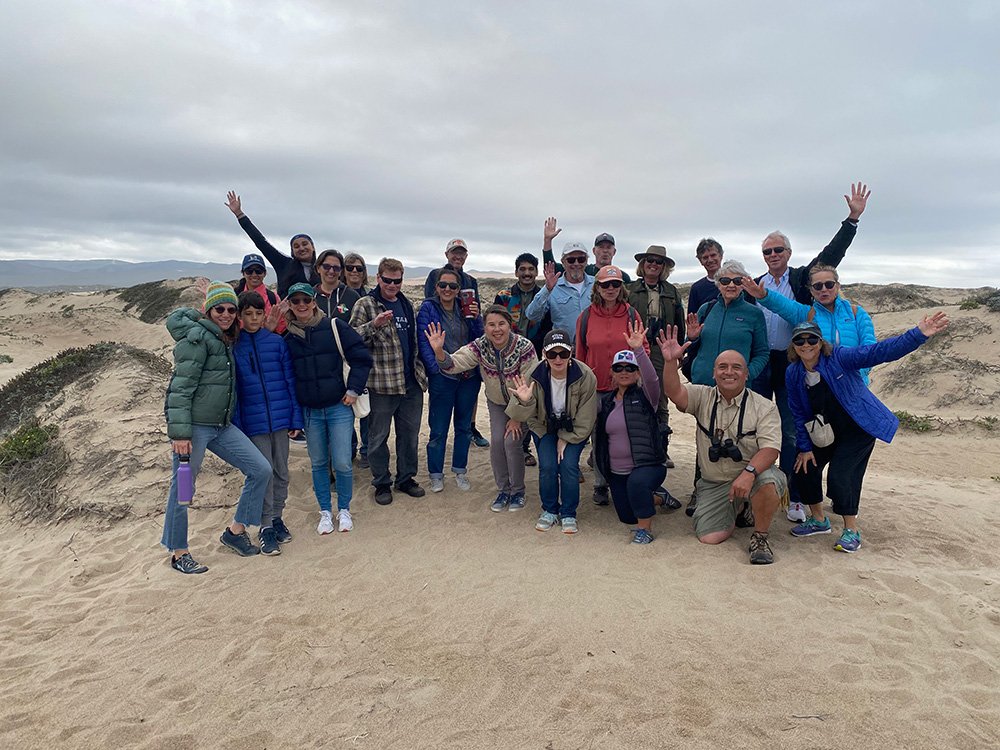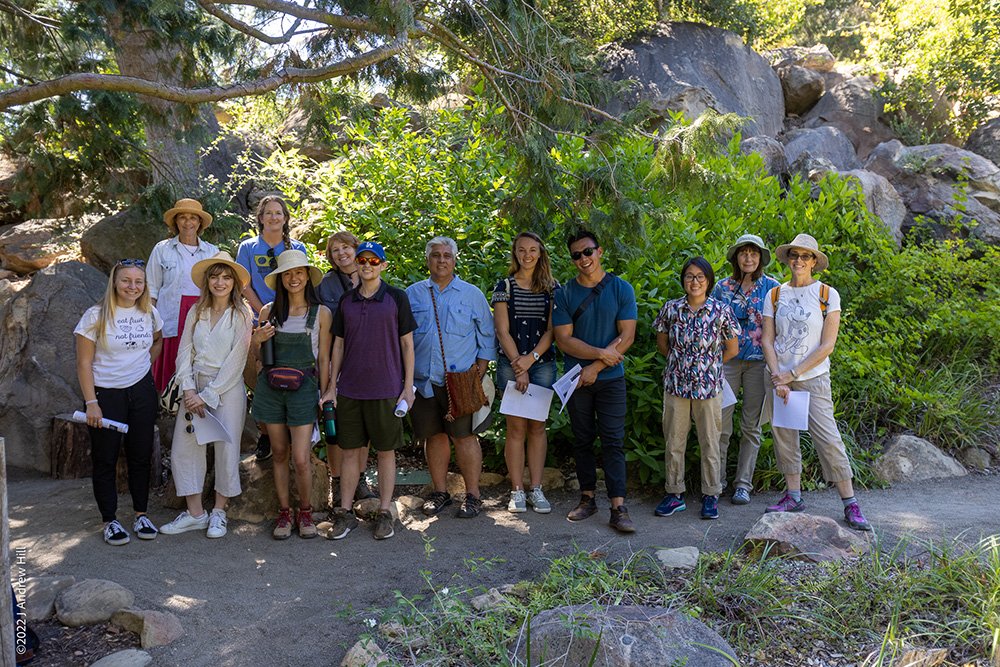
Climate Leadership > CEC’s Climate Stewards Certification Program > Course Details
CEC’s Climate Stewards Course Details
About the course
CEC’s Climate Stewards certification course provides the resources, training, and confidence for participants to join the grassroots climate action movement on California’s Central Coast. Instructors introduce students to social-emotional learning and trauma-aware practices, climate change communication, the social dimensions of climate impacts, climate science, and community resilience planning. The interactive course features group discussions, field trips, guest lectures, and projects that immerse students in the unique dynamics of their local community.
With 70–80% of participants identifying as women, CEC intentionally elevates the lived experiences and leadership of women and girls — who are both disproportionately affected by climate impacts and essential drivers of community-based climate solutions.
Course outcomes
Shifting of individual understanding and behaviors as a result of taking the course;
The impact that individuals have on their local community as a result of their Stewardship Project and increased community engagement; and
Ongoing commitment to volunteerism and activism as a result of increased understanding and awareness of climate change and its social and equity impacts, including those related to gender.”
course components
Weekly instruction: Class sessions are held from 6:30 – 8:30 p.m. PST on Tuesdays online via Zoom.
Field trips: The course includes three to four in-person field trips designed to connect participants with local climate solutions. Field trip sites are in and around Santa Barbara and Ventura Counties and may include visits to local landfills, engaging in beach clean-ups, or taking tours of conservation and restoration sites. Field trips typically take place on weekend mornings or afternoons and are generally scheduled for two hours, not including travel time. Students are responsible for transportation to and from field trip sites (carpooling is encouraged and course instructors provide coordination options).
Stewardship Project: The Stewardship Project provides participants an opportunity to use the course's knowledge and resources to develop a project that pushes forward local climate action. Participants can choose any project that aligns with their interests and is within project guidelines. Often, participants continue their projects after the course ends and create exciting community action. Projects can be completed individually or in groups, and participants must receive approval for Stewardship Projects within the first four weeks of the course. Participants deliver an individual or group presentation (5 minutes per person) during the final course session. Participants are expected to spend at least eight hours on the Stewardship Project.
Example Stewardship Project: Conscious Clothes: Shop, Care, and Dispose Responsibly by CEC Climate Steward Dass Richardson
STAYING INVOLVED
After participants graduate from the course, there are several ways to stay connected with the growing community of alumni. CEC program staff distribute an alumni newsletter featuring volunteer opportunities, stewardship project updates, upcoming events, and more. Alumni are invited to special events at CEC’s Environmental Hub, including some designed for alumni. There is also a CEC Climate Stewards Instagram account, showcasing alumni projects, current cohort activities, and other efforts. Meet our alumni.
course information
This college-level course was developed and accredited by the University of California Division of Agriculture and Natural Resources (UCANR) and is managed by the UC Environmental Stewards program. Although other Climate Stewards courses are taught throughout California, CEC is currently the only Central Coast partner. Classes are held on Tuesday nights for 8 weeks from 6:30pm-8:30pm (with one week set aside for project preparation, see details below). Total course work is an approximate 40 hour time commitment. CEC generally offers the Climate Stewards course three times per year. The CEC Climate Stewards Course website will open registration and share information for upcoming courses about one month before the course begins.
Dates: The next course is from January 27, 2026 to March 17, 2026.
Course schedule: Class sessions are held from 6:30 – 8:30 pm PST on Tuesdays online via Zoom. Three to four field trips are scheduled on weekend mornings or afternoons.
Tuition/fees: The course fee is $360 and covers instruction costs and University of California Agriculture and Natural Resources (UCANR) course fees. A limited number of scholarships are available for those who express financial need. No one will be turned away due to lack of funds. Diverse candidates are encouraged to apply.
Instructor: Kathi King, CEC Director of Outreach and Education
Teaching Assistant: Ali Hanson, CEC Climate Steward Alumna
To apply: Please fill out the registration form and CEC staff will respond within 2-3 business days with any follow-up questions and confirmation.
Contact the CEC Climate Stewards course instructor Kathi King at kking@cecmail.org with questions or concerns.

Course Requirements
Time Commitment
Each Climate Stewards course consists of a minimum of 40 educational hours (online, classroom, and field time), which includes a minimum of 12 hours in the field.
Required Reading and Online Work
Climate Stewardship: Collective Action Across California by Brendan Buhler and Adina Merenlender (must be purchased by participant)
Climate Stewards Handbook
Completion of six (6) online course modules
Completion of assigned homework
This course will be taught using a combination of online sessions via Zoom, in-person sessions, and the Canvas platform. Participants will need access to the internet to listen to lectures and read course material.
Course structure: This course will be taught with a combination of online self-guided modules, in-person sessions, and the Canvas platform. All participants will need access to the internet to listen to lectures and read course material.
Class Attendance and Field Trips
Participants must attend all classes, with the opportunity to make up missed activities from one class session. The participant is expected to complete make-up activities on their own time at the direction of the instructor. Participants are required to attend at least 2 field trips.
Stewardship Project Topics
Participants are required to complete a Stewardship Project in one of six areas: Community Resilience and Adaptation, Environmental and Climate Justice, Conservation/Restoration (Stewardship), Participatory Science, Education/Interpretation, or Program Support.
Stewardship Project Details
The Stewardship Project provides an opportunity for participants to integrate their own personal interests with the in-class material toward the development of an applied work project done in conjunction with a community organization. Participants must receive pre-approval for Stewardship Projects within the first four weeks of the course. Participants are encouraged to work in teams when appropriate. Participants will deliver an individual or group presentation (5 minutes per person) during the final course session. Participants are expected to spend a minimum of 8 hours on the Stewardship Project and will add hours spent on the Stewardship Project into the volunteer portal.
Course Evaluation
Completion of the online post-course evaluation survey is critical for the ongoing success and improvement of the course. You will be provided with a link to the evaluation survey toward the end of the course.
Volunteering and Volunteer Portal (VMS)
Participants will be provided with an online account to track their volunteer hours, including hours spent on their stewardship project. Tracking volunteer hours is an essential way to prove the need and impact of the Climate Stewards Initiative.
Course Policies
Expenses
Participants are responsible for course fees, required books, transportation to and from field trips, and costs associated with travel.
Homework
Homework assignments will be due prior to the next scheduled class session.
Attendance
Participants must complete [minimum of 40+] hours of instruction during the class. Only one class session (2 hours) can be missed and participants can request a make-up session or assignment from their instructor. Two in-person field trips are required.
Cancellations and Refunds
Participants may withdraw from the course with a full refund (minus a $50 administrative fee) if they cancel their enrollment at least two weeks in advance of the first day of class. Participants that can successfully refer another student to replace their spot in the course prior to the first day of class will receive a full refund. Registrants that experience a verifiable medical emergency personally, or in their family, between the two weeks of class before and after instruction has begun may re-enroll in the following year’s course at a 50% discounted rate, with priority for early registration. No other cancellations, for any other reason, will result in a refund.
Volunteering and the Volunteer Portal
Participants are encouraged to complete at least 40 hours of volunteer service each year. Annual commemorative pins are awarded to participants who meet this goal.
Volunteer activities must relate to climate communication, education, interpretation, mitigation, adaptation, or community or ecosystem resilience, occur in California, be sponsored by an organization, and be unpaid.
Participants’ eight-hour capstone project will count toward the first year’s volunteer hours.
Hours are logged by participants in the UC Volunteer Portal. Once registered for the course, participants will receive a welcome email with a user name and password. If this email is not received, contact the instructor. Learn how to use the portal.
Recommended Reading and Resources
Community Environmental Council – explore our website and subscribe to our mailing list to receive CEC updates, including webinar invitations
Climate Forward newsletter – published every Wednesday by the New York Times
Boiling Point newsletter – published weekly by the Los Angeles Times
Climate One podcast
The Thinking Person’s Guide to Climate Change, Robert Henson
How to Save a Planet podcast
Canary Media - non-profit, free source for environmental news
CalNat YouTube Channel - view videos from Climate Stewards conferences, meetings, and more
CalNat Mapping Tool - a GIS-based map-producing tool you can use to explore bioregions, compare and contrast filed sites, and create maps to field trips, capstone projects, and more
Statement on Inclusion and Accommodations
If you have a learning or physical need that will require special accommodations in this class you will need to notify your instructor in writing of your accommodation needs. Please notify at least 30 days prior to the first class if you require any special accommodations. This will allow us ample opportunity to provide suitable accommodations. We make reasonable accommodations for persons with documented disabilities. Materials will be available in alternate formats (Braille, audio, electronic format, or large print) upon request.
Statement on Financial Accessibility
Full and partial scholarships are available. We are seeking a large and diverse group of students – no one will be turned away for lack of ability to pay the course fee. Contact us if you need financial assistance.


